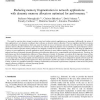Free Online Productivity Tools
i2Speak
i2Symbol
i2OCR
iTex2Img
iWeb2Print
iWeb2Shot
i2Type
iPdf2Split
iPdf2Merge
i2Bopomofo
i2Arabic
i2Style
i2Image
i2PDF
iLatex2Rtf
Sci2ools
140
click to vote
COMCOM
2006
2006
Reducing memory fragmentation in network applications with dynamic memory allocators optimized for performance
The needs for run-time data storage in modern wired and wireless network applications are increasing. Additionally, the nature of these applications is very dynamic, resulting in heavy reliance on dynamic memory allocation. The most significant problem in dynamic memory allocation is fragmentation, which can cause the system to run out of memory and crash, if it is left unchecked. The available dynamic memory allocation solutions are provided by the real-time Operating Systems used in embedded or general-purpose systems. These state-of-the-art dynamic memory allocators are designed to satisfy the run-time memory requests of a wide range of applications. Contrary to most applications, network applications need to allocate too many different memory sizes (e.g., hundreds different sizes for packets) and have an extremely dynamic allocation and de-allocation behavior (e.g., unpredictable web-browsing activity). Therefore, the performance and the de-fragmentation efficiency of these alloca...
Related Content
| Added | 11 Dec 2010 |
| Updated | 11 Dec 2010 |
| Type | Journal |
| Year | 2006 |
| Where | COMCOM |
| Authors | Stylianos Mamagkakis, Christos Baloukas, David Atienza, Francky Catthoor, Dimitrios Soudris, Antonios Thanailakis |
Comments (0)

